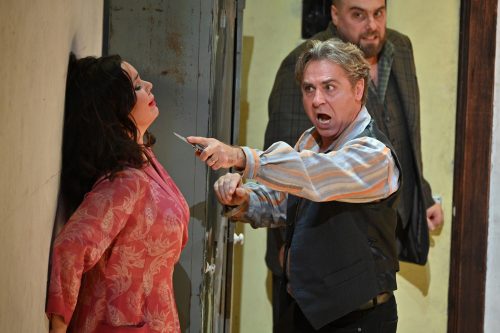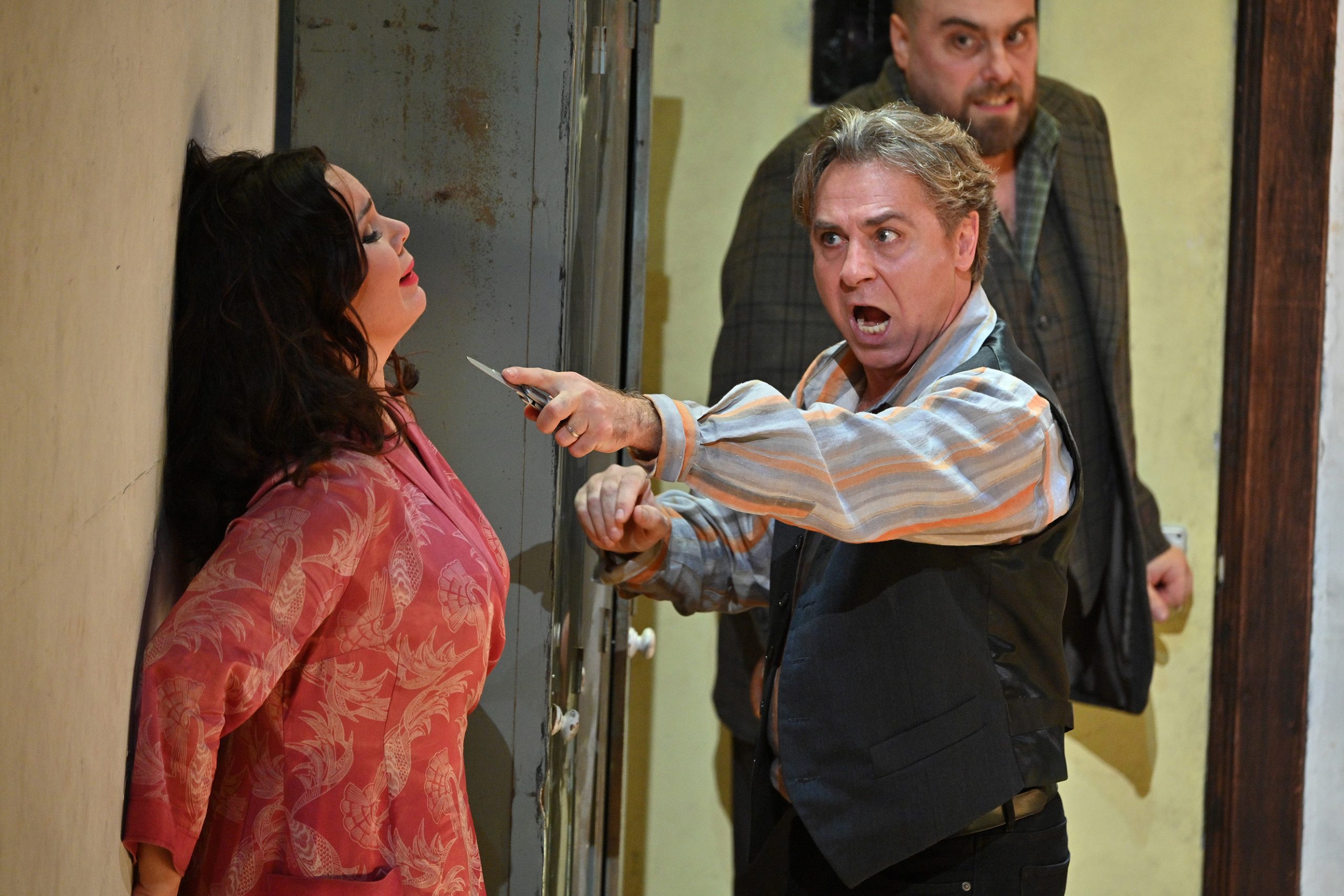
(c) A. Bofill
 Spain Mascagni, Cavalleria rusticana, & Leoncavallo, Pagliacci: Liceu Chorus & Orchestra / Henrik Nánási (conductor), Gran Teatre del Liceu, Barcelona, 9 & 10.12.2019. (JMI)
Spain Mascagni, Cavalleria rusticana, & Leoncavallo, Pagliacci: Liceu Chorus & Orchestra / Henrik Nánási (conductor), Gran Teatre del Liceu, Barcelona, 9 & 10.12.2019. (JMI)
Production:
Director – Damiano Michieletto
Sets – Paolo Fantin
Costumes – Carla Teti
Lighting – Alessandro Carletti
Casts:
Cavalleria rusticana
Santuzza – Elena Pankratova / Oksana Dyka
Turiddu – Roberto Alagna / Teodor Ilincai
Alfio – Gabriele Viviani / Àngel Òdena
Mamma Lucia – Elena Zilio / María Luisa Corbacho
Lola – Mercedes Gancedo
Pagliacci
Canio – Roberto Alagna / Marcelo Álvarez
Nedda – Aleksandra Kurzak / Dinara Alieva
Tonio and Prologue – Gabriele Viviani / Àngel Òdena
Silvio – Duncan Rock / Manel Esteve
Beppe – Vincenç Esteve
This double-bill opera program par excellence was last presented here at the Liceu in 2011. In the award-winning Damiano Michieletto production, which premiered at Covent Garden in December 2015, the two operas are staged as a continuation in time, with Pagliacci also taking place on Easter morning.
The Cavalleria rusticana staging, with its well-defined characters, is very successful. The action is set in the town square with Mamma Lucia’s Bakery, where Silvio (Nedda’s lover in Pagliacci) works, in the middle. The opera begins in the Prelude with Turiddu lying on the ground – where he will also be found at the end. The procession scene is nicely done, with a Madonna who comes to life and angrily points to the excommunicated Santuzza.
The sets are on a rotating stage, with the square on one side and the inside of the bakery on the other. The least convincing part for me is the darkness of the environment: it makes no sense to leave a morning Mass with everything in the dark. Both operas are set in the 1970s, and the costumes are appropriate.
In Pagliacci, Michieletto’s concept is less convincing. The rotating stage now has a small theater on one side and dressing rooms on the other, which does not suit the first part of the opera. The pantomime features doubles of the protagonists and is a little confusing. In the intermezzo, Mamma Lucia and Santuzza come out on stage, the latter confessing to the priest, while Mamma Lucia embraces Santuzza and shows her joy at the young woman’s pregnancy.
The musical direction was in the hands of Henrik Nánási, who was last in Barcelona leading a strong performance of The Magic Flute at the close of the 2015-2016 season. He is a competent conductor, although I found him less convincing here than on previous occasions. My impression is that verismo is not the genre to which he is best suited. His reading was correct but below the level I had expected: I missed more passion.
In the first cast of Cavalleria rusticana, Santuzza was played by soprano Elena Pankratova. I think that the role of Santuzza works better with a mezzo-soprano and not a dramatic soprano like Pankratova; I prefer her in other kinds of opera. The second Santuzza was Oksana Dyka, and I also found her unconvincing. Once again, we were hearing a soprano, a voice that does not suit the demands of Santuzza. In addition, Dyka’s voice seemed lighter than before.
As in Berlin last September, Roberto Alagna as Turiddu was superb – the best from both casts. His voice is remarkable and could be heard perfectly throughout the house while retaining that well-known brightness. He stood out in his interpretations of the ‘Brindis’ and in ‘Addio a la Mamma’. Turiddu in the second cast was sung by Teodor Ilincai. Clearly, the center of his voice has widened but not the rest of the tessitura; he sang with a pronounced vibrato and all in forte.
Continuing with the main protagonists, Roberto Alagna as Canio was again impressive. His voice leaves nothing to be desired, and his interpretation was appropriate. The always much-expected ‘Vesti la giubba’ was brilliant, and he received a huge ovation. Voices could be heard asking for a ‘bis’, but this was not granted.
In the second cast, Canio was played by Marcelo Álvarez; he replaced Fabio Sartori who had initially been listed for the part. There is no doubt that he is one of the most important tenors of recent years, although lately he has been less active. His voice is as beautiful as ever in the middle but weaker at the bottom of the range. His performance was fine on this occasion, and the first part of his aria was perfectly sung.
Aleksandra Kurzak in the part of Nedda was appealing in terms both of singing and acting. It is admirable how this soprano has accommodated her repertoire to that of Roberto Alagna, her husband, and is doing it in a way worthy of being highlighted. In the second cast, Dinara Alieva had an attractive voice and sang well, though her Italian diction could be improved.
Among the other characters, Alfio and Tonio were played in the first casts by Gabriele Viviani, whose voice is nicely suited to the parts. Mercedes Gancedo made a good impression in the part of Lola, and Mamma Lucia was properly interpreted by veteran Elena Zilio. Duncan Rock as Silvio has a pleasant voice but some projection problems in the higher notes. Manel Esteve and Vincenç Esteve were also good.
Jose M. Irurzun
